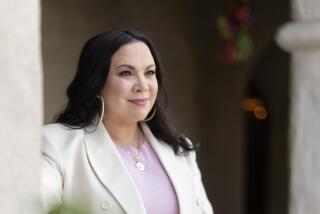Breaking the Latino Code of Silence Over Sex : Parenting: KCET documentary is intended to help families communicate on a once-taboo subject.
- Share via
Maria del Rosario Martinez watched soberly as an instructor drew female sexual organs on a blackboard.
She and eight other Latino mothers, many with toddlers, listed to explanations of menstruacion, menopausia and reproduccion . They had come to a community group at Carr Intermediate School school in Santa Ana to learn more about sexuality so they may better talk to their children about the facts of life .
“I never received education about sex,” Martinez said in Spanish through a translator. And she in turn never broached the subject with her seven children, the eldest of whom is now 23.
Martinez’s situation is not uncommon. Cultural taboos often prevent Latinos, more than others, from openly discussing sex within the family, according to the producers of “Values, Sexuality and Family,” a documentary targeted for Latino parents and intended to help them effectively communicate with their children about sex.
The program, to air Sunday at 7 p.m. on KCET Channel 28 in English and at 10 p.m. on KMEX Channel 34 in Spanish, was produced by KCET and Sylvan Productions. It features Comadres, an educational program that runs the group Martinez attends, and others like it in Philadelphia and Miami.
“(Latino) parents may think if they talk about sex they are promoting it or encouraging a child to do it, so it’s best not to talk about it,” “Values” director Sylvia Morales said recently.
“There’s also a double standard that is so strong in Latino culture,” she said. “It’s acceptable for men to have sex--that’s what men do. But a woman is expected to be virginal. Contradictions like this make things very difficult.”
But the need for frank communication, regardless of parents’ stance on premarital sex, is critical, Morales said. The documentary reports that Latino youths between 13 and 19 comprise about 9% of the nation’s population but represent nearly 18% of AIDS cases. In addition, teen pregnancy among Latinos is markedly higher than among Anglos, the program says.
Funded by a grant from the Centers for Disease Control, the documentary was made to complement the center’s national AIDS prevention campaign, America Responds to AIDS. It was also prompted by response to “SIDA is AIDS,” a 1988 co-production of KCET and Morales’ Sylvan Productions. (SIDA is the Spanish acronym for AIDS.)
That program, which outlined the gravity of the epidemic among Latinos, drew requests for more information, Morales said. “After ‘SIDA’ aired, a lot of people wanted to know, ‘How do we talk to our children about this?’ ” she said.
To answer that question, “Values” producers turned to the National Coalition of Hispanic Health and Human Services Organizations, which had designed an educational program to help parents communicate with their children about sex. It identified tools, or values, crucial to family communication, such as trust, mutual respect between parents and children, good listening and self esteem. Ways to build and utilize these values form the heart of the documentary.
Morales acknowledged that the program is just “one tiny little step” toward its goal--it takes more than 30 minutes in front of a TV set to build self-esteem, respect and good communication.
Narrator Teresa Rodriguez suggests to viewers that they contact local agencies or health professionals for further information, and gives a toll-free number for a bilingual AIDS hot-line sponsored by the Centers for Disease Control.
More to Read
Sign up for Essential California
The most important California stories and recommendations in your inbox every morning.
You may occasionally receive promotional content from the Los Angeles Times.













